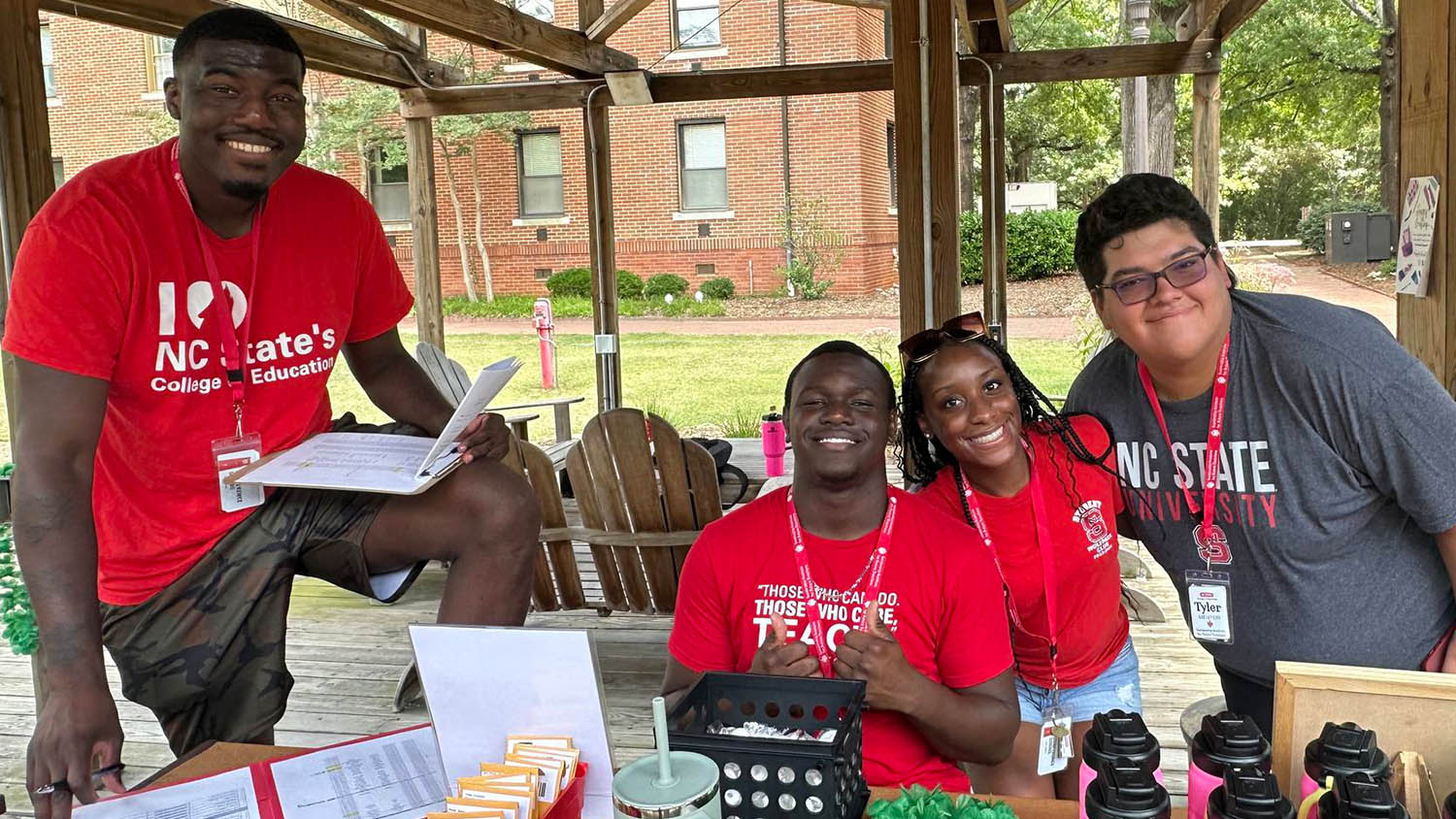Undergraduate Students Inspired by College of Education Faculty While Engaging in Research Work Through PEP Program

Martia Williams ‘22 still has more than a year to go before she earns her bachelor’s degree in mathematics education, but she already has plans for obtaining advanced degrees and conducting research in her future career in education. So, when she learned about an opportunity to get involved in research while she was still an undergraduate, she was eager to participate.
Williams is one of about two dozen NC State College of Education students who participate in the Provost’s Professional Experience Program (PEP), which supports student success by providing meaningful on-campus employment with an NC State faculty member that emphasizes research and career development.
She joined the program at the beginning of the Fall 2020 semester, working with Robin Anderson, Ph.D., assistant professor of mathematics education in the College of Education.
“I was interested because Dr. Anderson was the person who I was going to be working with and I had really enjoyed being in her classes. Also, I’m interested in pursuing higher degrees in education, so I thought this would be a really great opportunity,” Williams said.
Over the past few months, Williams has been assisting Anderson with research that focuses on how teachers interact and seek professional development through Facebook groups and examines the ways they chose to interact online, the motivations behind those interactions and trends that emerge. She has had the opportunity to look through video footage of teacher interviews, summarize and categorize information and read through journal articles that relate to the research.
“I really wanted my PEP student to be involved in a research project that was looking at the experiences of classroom teachers. The data set provides a real look at the areas in which teachers seek extra support and what resources are available to them in online communities,” Anderson said. “Training to be a teacher in undergraduate classrooms provides a lot of different ways to learn about being a teacher and the PEP experience just adds to what they learn in their coursework.”
Williams said that her experience in PEP has not only helped her to learn more about the research process to better prepare her to conduct her own research in the future, but the information from the study has introduced her to a variety of new resources and opportunities available for her own professional development.
James Daniels ‘21, a middle grades English language arts and social studies education major, said his experience in the PEP program has also helped him to develop his skills as a future classroom teacher.
Working with Michelle Falter, Ph.D., assistant professor of literacy education, Daniels is contributing to a content analysis of middle grades and young adult literature to assess whether or not they meet the criteria for Project Lit — a grassroots network of book groups that aims to get students excited about reading by highlighting diverse, high-interest, culturally relevant books.
Daniels said the work is helping him to develop an understanding of the books that will be meaningful, relatable and important to his future students, as well as which books will challenge them and their beliefs.
“This research, for me as an educator in the classroom and beyond, is really going to be key to noting some of the issues that students are encountering and how they’re encountering those issues,” he said. “Literature is very important to me. I want my students to read, but I want them to also be reading things that are actually building them up, so this is helping me know what’s present.”
Falter noted that while she will sometimes share information about her research as it relates to content in the courses she teaches, most undergraduates only get to have a basic understanding of research and the process involved. The ability to engage in research through the PEP program, she said, will provide undergraduates with valuable skills even if they don’t eventually pursue a doctorate degree.
“I think all aspects of the research process are beneficial for teachers. At the heart of research is inquiry, and I hope that undergraduates who engage in research work will see how they could employ strategies of inquiry to their own teaching practices in the classroom,” Falter said. “I think PEP is a wonderful program that gives our students real experience in seeing how professors do the other part of their work — the research.”
Daniels said that having the opportunity to work with and be mentored by Falter outside of the traditional classroom setting has had a tremendous impact on both the way he educates as well as the way he views education as a whole.
“It was very instrumental for me to see that somebody cared as much about literacy and how it looks for students of all creeds, all colors, all backgrounds and all ethnicities,” he said. “To see somebody who is that passionate about it, I can see that it is possible to bring these types of books to adolescents and you can say ‘this matters’ and then take what you learned from academia and put it back into the community.”
Williams said that the time she has spent with Anderson has also had an influence on her as an educator, helping her to become more intentional in her teaching.
Although she has always loved math, Williams said that a series of poor math teachers coupled with the fact that she was often the only female of color in her advanced courses in high school, made her hate math class. She hopes to become an educator who can support children who have had similar negative experiences and make them feel welcome in the class, and Anderson has helped introduce her to ways that she can help those students.
In addition, conversations with Anderson and her postgraduate experience have inspired Williams to leave her comfort zone to potentially earn a master’s degree in multicultural education at a university on the west coast before eventually returning to the College of Education to earn a Ph.D. in the educational equity program area of study.
“Being exposed to the work of graduate school, particularly research demands, is one of the benefits of the PEP program,” Anderson said. “I know Martia will be a fantastic mathematics teacher and I look forward to the day she thinks about graduate school and the possibility that maybe we could one day be colleagues.”
- Categories:


